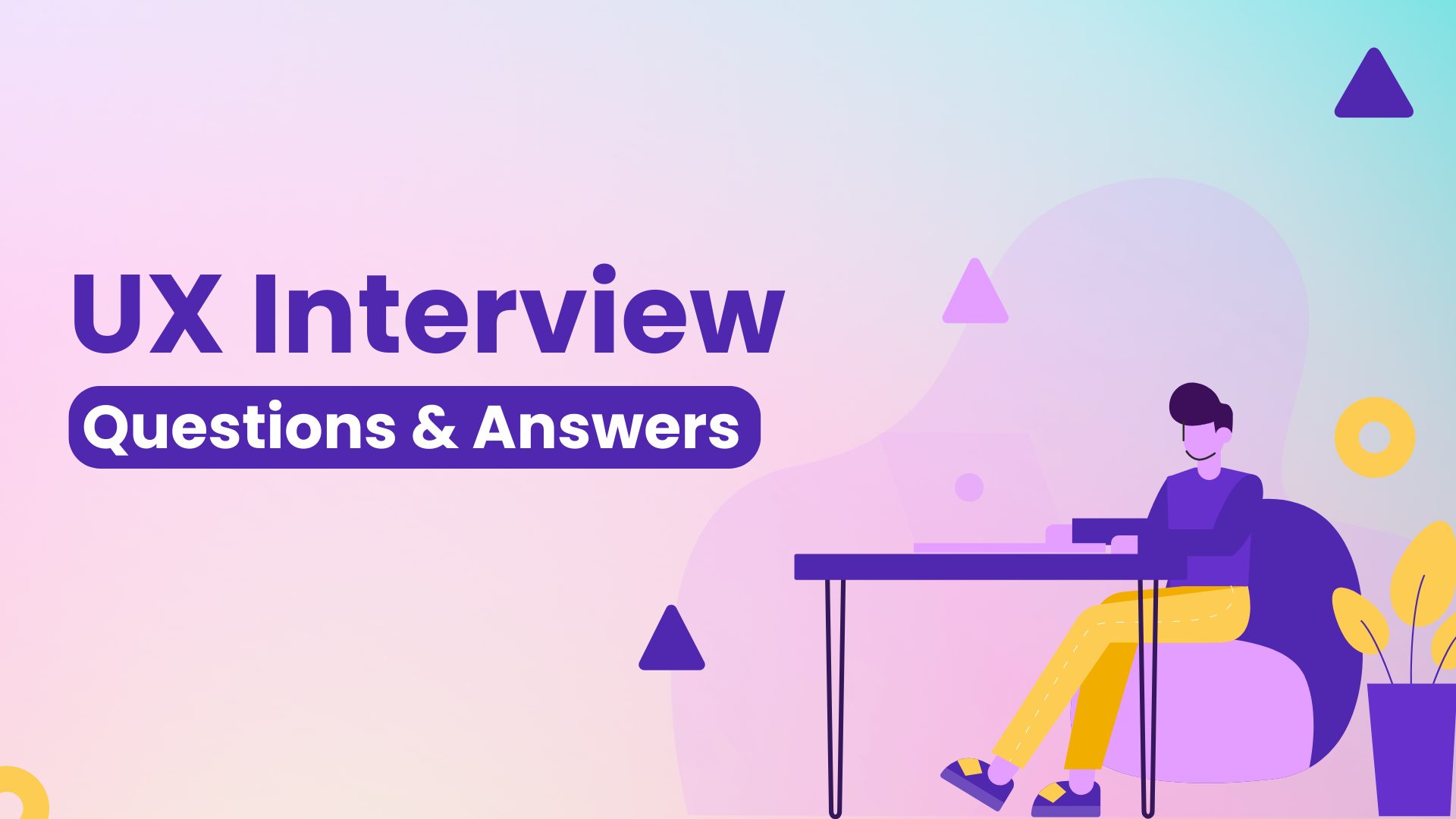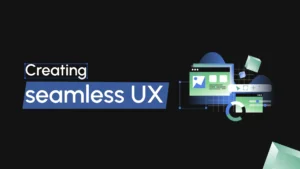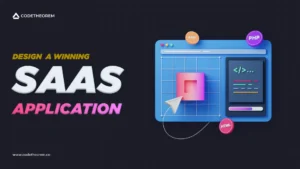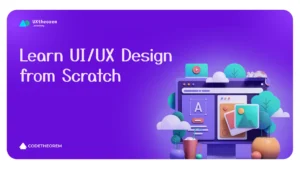Have you ever been on a date? If yes, UX design interviews are similar to a first date. As UX designers, you won’t face much of a problem even if you have itsy-bitsy experience. However, remember that no matter how prepared you are, there’s always a chance of unexpected questions. So, there’s no way to predict the interview process. But there are a few questions you can go through and a few things you can do to prepare. Therefore, this blog will walk you through all the essential UX interview questions. Furthermore, it will guide you on how to answer the questions in the best way possible.
What will this blog cover?
- Common UX Interview Questions
- UX Design Interview Questions – Personal Background
- UX Design Interview Questions – All About Your Work & Process
- Common Situational UX Designer Interview Questions
- UX Design Interview Questions – What Are Your Goals?
- Conclusion
Article content
Common UX Interview Questions
Now, you need to understand that the interview process for a UX designer varies from company to company. Some interviews may feel like a casual conversation, and some may have a formal structure. Although the process and the question pattern may vary, every interview’s goal is the same. That is to get the best candidate for the role of UX designer.
The common UX interview questions are usually easy to answer. The employer may ask them to access and test your basic knowledge of UX design. So, the common UX designer interview questions may include the following:
1.) What is UX design? How do you define UX?
Answer: You don’t need a book definition to answer this question. Simply, you can let the interviewer know what UX design means in your words. Also, try mentioning its importance and the principles of UX design too. They could include:
- Put the user first
- Make the design process user-centric
- Conduct thorough user research
- Do usability testing
- Use empathy and personas to predict customer behavior.
Link these principles to the business goals. That way, you can show the employer how to build value for the company. Also, let the interviewer know that you understand
Additional Questions can be asked
- Name the elements of good UX.
UX Design Interview Questions – Personal Background
Next, the interviewers usually tend to get to the questions that help them get to know you. These questions could relate to your personality, motivations, and work process.
2.) Tell us about yourself.
Answer: Here, the interviewer means, “walk me through your educational and professional background.” So, basically, you need to give a verbal summary of your resume. Moreover, they want to know how you ended up in this field. Try answering these questions yourself to get an idea of what all to mention at the time:
- What brought you here?
- How much experience do you have in the UX field?
- What exactly does your journey as a UX designer look like so far?
- What personal or professional experiences set you apart?
3.) What made you decide to pursue a UX design career?
Answer: To put it creatively, think of your ‘UX story.’ Consider answering the following questions to get a better idea of what to say at the time:
- How did you discover your passion for UX design?
- When did it occur to you that you could be a professional user experience designer?
- What excited you the most about UX design?
Try to keep your story crisp and relevant. Also, try linking back to the role you’re applying for. In addition, you can also give an idea of where you want your career as a UX designer to take you.
4.) What is your biggest strength/weakness as a UX designer?
Answer: It is best to answer this question – keeping in mind the company’s requirements. Therefore, you must link your strengths to the factors that the company might be looking for in a UX designer candidate.
As simple as this question may sound, it is one of the most critical and complex UX designer interview questions. Why? Because here, the interviewer wants to know how well you understand yourself. Whether you know at what points you can perform well and what things or phases are challenging for you. So, focus on mentioning your most successful projects so far. Tell them why the project was successful. How did you contribute toward the final outcome? Moreover, you could talk about the measurable results here.
If there was any particular UX design challenge you faced or any project you couldn’t do well at, mention that. You may not get into the details. Just let them know what held you back and what could’ve helped you do better.
5.) What is your design inspiration?
Answer: Here, you can talk about your UX design inspiration resources. Talk about the websites, community, magazine, social media pages, or individuals from whom you get inspiration to design new stuff. Also, talk about what you’ve learned (UX design skills, if any) from these resources and individuals. That way, you assure them that you are a keen learner. Moreover, this shows them that you make time for development as a UX designer. So, as far as you can talk about why the resources you name are inspirational to you, the interviews will be all years.
Additional Questions can be asked
- Who are your design heroes?
- What are some UX-related publications that you read?
UX Design Interview Questions – All About Your Work & Process
Now, this is your time to shine. How and Why? The UX interview questions here will be all about the work you’ve done so far and your UX design process. Therefore, you must show them what sets you apart from other UX designers.
6.) How is UX design different from UI design?
Answer: The answer to this question depends on the role you’re being hired for. If the company wants to hire you for a UX designer job, they need to see that you can distinguish between the two. Most importantly, they want to be sure that you’re focused on the user. Moreover, you know how to make things more valuable than beautiful. Although the final product will be both, the UI designer will take care of the aesthetics. In addition, talk about how the user interface and UX designers work together.
7.) Tell me about your most/least successful UX design project.
Answer: To answer this question, you can talk about projects you’ve worked on that are similar to the company’s domain/niche. Let them know what it was about and how you contributed to its success as a UX designer. Moreover, it’s best to show them measurable results and the impact you could create with your efforts.
If they are persistent on learning about your least successful project, be honest, but also be strategic here. So, paint yourself in a good light. Talk about the challenges you faced. Try to give them valid reasons for not getting desired/expected results. Moreover, tell them about how you overcame the challenges and learned lessons.
8.) Take Me Through a Couple of Your Favorite Pieces in Your Portfolio
Answer: Walking the interviewer through your UX design portfolio can be challenging. Why? Because it is difficult to give background and context on any previous projects you’ve worked on. Thus, ensure you practice in advance. This will prevent you from becoming flustered. Remember, not all interviewers are UX designers. Thus, you must ensure to practice with a person who isn’t in the design field.
9.) What are some of the biggest challenges you’ve faced as a UX Designer?
Answer: This is one of the common UX interview questions for UX designers. The trick to answering this question effectively is to use examples. Therefore, it’s best to pick something from your portfolio to demonstrate the challenges you came across as a UX Designer. Talk about a project that was challenging for you. Also, please share your experience and how it helped you develop new UX design skills. So, all they want to know is:
- How do you solve problems?
- How do you handle the pressure?
- How do you work under different circumstances?
Additional Questions can be asked
- What are the elements of good UX?
- Are there any websites or apps whose designs you love? If yes, Why?
- Elaborate on your design process.
- What research methods do you use?
- Do you know of a design example that solved a business problem?
- Elaborate on universal design.
- How do you decide which features to add to your product?
- What does the term ‘design-thinking’ mean to you?
- What, according to you, will be the next big thing in UX design?
- In your opinion, what are some of the most impactful UX trends?
Common Situational UX Designer Interview Questions
This specific set of questions aims at checking your ability to handle real-life situations in the design field. These questions are more practical in nature.
10.) When a client says: “I don’t like this design.” What do you do?
Answer: A good UX designer would exhibit thoughtful restraint in such a situation. Thus, you must show the interviewer that you don’t take the critique personally. However, you use it as an opportunity to uncover why a client may not like a design. Here, they want to see whether:
- you’re objective
- you rely on tried and true principles, past learnings, studies, and white papers
- You know UX best practices and UX trends.
- You follow design standards and design conventions that have been tested, studied, and validated.
Often UX designers do not take a step back and don’t ask intelligent questions to understand the issues a client may have with the design. But show them that you do. Share a real-life instance, if there is any. Suppose the client is subjective and says, “I don’t like that color?” you must inquire why. Moreover, ensure the client understands that design decisions are directly related to sound principles.
Select any product of your choice and identify the UX Design problem. Briefly explain how you would conduct research
For this one, the best is to go for a product similar to the one you’ve already worked on. That way, it’ll be easier for you to identify problems and describe how to conduct research. Moreover, you will be able to explain what you will change or modify to improve it. Furthermore, you could talk about the step-by-step research process. Consider presenting the following points briefly:
- What is the problem?
- What will be your first step for research?
- How will you approach user research?
- What user research methods will you use?
- Will you make any user persona? If yes, how will you use them?
- Will you map the customer journey? If yes, what insights would you hope to get from it?
Additional Questions can be asked
- Are you a good team player?
- What type of work environment do you prefer?
- How do you pass on your designs to the developers?
- What do you think is the best way to balance business goals with the goals of the end user?
- How will you measure the success of a product after the product launch?
- How do you collaborate with UX Designers,
- Web Developers or Product Managers?
- Has any of your projects ever gone off track? If yes, what did you do to fit it?
- Tell me about anything you did wrong. What did you learn from the process?
- How do you handle negative feedback?
UX Design Interview Questions – What Are Your Goals?
When it comes to the UX design interview questions related to goals, you must always be straightforward. There is no point in twisting your answers.
11.) Where do you see yourself in five years?
No doubt, this can be a challenging question for many. Planning long-term is not everyone’s cup of tea. However, the interviewer here wants to know whether you have some idea. If this UX career path interests you, you’d like to stay. Therefore, you can tell them what this UX designer job looks like for you. Also, you could let them know if there is a field of UX in which you want to gain expertise. In that case, explain to them how this position will help you get there. Or do you want to become one of the principal UX designers? You cannot achieve that in mere five years. Yet, you can explain what you will do in the next five years to get closer to that goal.
Additional Questions can be asked
- What do you find most exciting about this position?
Conclusion
Now that you’ve gone through this blog, we’re optimistic that you’re well-prepared for a UX designer interview. Since it covers almost all the basic questions related to UX design, you get a fair idea of the vital thing you must speak about. However, if there is still anything that you want help with, you can connect with Code Theorem. Our professional UX designers are well-versed in the subject. Moreover, our UX designers have relevant experience to help you prepare for an important interview. So, you can either mail us or drop your comments in the comment section below.


















